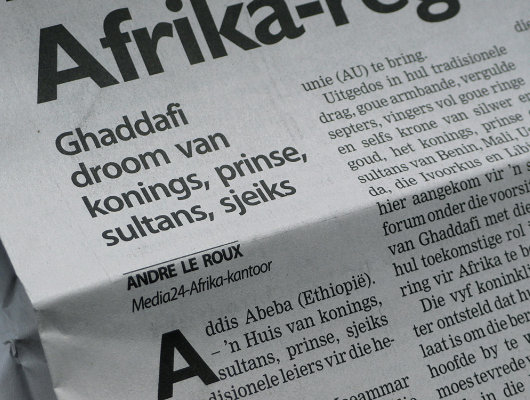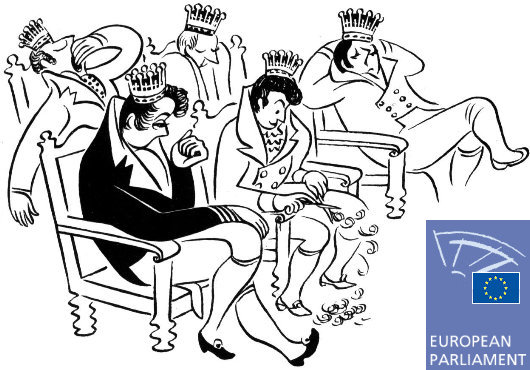
About Andrew Cusack
 Writer, web designer, etc.; born in New York; educated in Argentina, Scotland, and South Africa; now based in London.
Writer, web designer, etc.; born in New York; educated in Argentina, Scotland, and South Africa; now based in London. read more
News
Blogs
Reviews & Periodicals
Arts & Design
World
France
Mitteleuropa
Knickerbockers
Argentina
The Levant
Africa
Cape of Good Hope
Netherlands
Scandinavia
Québec
India
Muscovy
Germany
Academica
Of tribes and traditions
In tribal Africa, Ghaddafi expounds traditional government; Meanwhile ethnic Romanians vote to be ruled by their German neighbours.

«Ghaddafi dreams of kings, princes, sultans, sheiks»
reports the Afrikaans newspaper Die Burger.
ONE OF THE LESS-REPORTED aspects of the selection of Col. Moammar al-Ghaddafi, the tent-dwelling Libyan leader and notorious eccentric, as Chairman of the African Union was his proposal that an upper house of “kings, princes, sultans, sheiks, and other traditional leaders” be added to the Pan-African Parliament. Col. Ghaddafi has been forthright in his condemnation of democracy as ill-suited to the African continent. “We don’t have any political structures [in Africa], our structures are social,” he explained to the press. Africa is essentially tribal, the argument goes, and as such multi-party democracy always develops along tribal lines, which eventually leads to tribal conflict and warfare. “That is what has led to bloodshed,” the AU chairman posited, citing the recent example of the Kenyan elections.
Europe, of course, solved the matter of tribal difficulties by brutally uprooting long-established peoples from their native lands after the Second World War and transferring them to jurisdictions in which they would ostensibly be part, not only of the majority, but of theoretically “national” states. Cities with centuries of Polish history became Soviet, towns as German as sauerkraut became Polish, and so on and so forth. Sometimes the undesired populations of multi-ethnic places were cruelly murdered, as recent revelations from the police in Bohemia have shown.
Still, remnants of the old cosmopolitan order remain. Proud Transylvania — or Erdély or Siebenburgen — still has a number of Hungarians, Szeklers, and “Transylvanian Saxons” (as the Germans are known), despite the fact that Transylvania has been ruled and repopulated by Romania (for decades under the brutal Communist regime of Nicolae Ceauşescu). A Saxon — Herr Klaus Johannis of the Democratic Forum of Germans in Romania — was not long ago elected mayor of Hermannstadt, which was designated the European Capital of Culture alongside Luxembourg for 2007.
Hermannstadt (called Sibiu in Romanian and Nagyszeben in Hungarian) was traditionally the center of Transylvanian Saxon life but the Germans today constitute less than 2% of the population, making the election a more remarkable display of cosmopolitanism on the part of the ethnic Romanian majority of the town. Another factor is the corruption perceived as being endemic among the Romanian political parties, leading ethnic Romanians to favour the smaller, more-localized German political party. Germans are 1.6% of the citizens of Hermannstadt/Sibiu but the DFGR hold 16 of the 23 city council seats. The German party, with similarly small populations, has also gained the mayoralities in Mediasch and Heltau, the second and third largest towns (respectively) in the county after Hermannstadt.

While Africa ponders her future, what of Europe’s traditional leaders — her kings, princes, dukes, margraves, counts, and barons? In the past we have been used to Europe taking the lead, but in this situation has not Africa shown the right way forward? An upper house of nobility for the European Parliament, with a chancellor elected by such an august body, would be a great improvement and reform of the current European institutions. Tradition, it has often been said, is the democracy of the dead. It gives the wisdom of the past a say in the future. Is it not time we finally made use of the nobility? Of the particularity of their knowledge & experience, their long record of service, and their intimate connection with the past?
Through both the benefits and errors of imperialism, Europe lent a great part of her heritage to Africa. It is why a Nigerian can speak the language of Shakespeare and a president of the Ivory Coast became one of the immortels of the Academie française. Perhaps, at least on this subject, it is time Africa lent Europe the benefits of her experience. A European Union that is democratic and aristocratic would be a project that is both popular and wise — too adjectives rarely ever applied to the E.U. in its current form.
Search
Instagram: @andcusack
Click here for my Instagram photos.Most Recent Posts
- Burns Tower April 19, 2024
- Patrick in Parliament March 18, 2024
- Articles of Note: 13 March 2024 March 13, 2024
- Cambridge March 9, 2024
- Taken on Trust March 4, 2024
Most Recent Comments
Book Wishlist
Monthly Archives
Categories



Two things:
1. This shows what I’ve thought is the great irony of this age: In the event that the West goes to hell, Africa will likely, for a season at least, become the repository of the institutions and, to some degree, the culture of Western Civilization.
2. I am not a monarchist, save when it comes to other peoples monarchies. But a European House of Sovereigns is the best idea I’ve heard in a while.
My proposal: Any noble House that was sovereign at the time of the Vienna Congress should be so again, unless they are currently living within a monarchy. The historic family seat and some surrounding land should be ceded to the house by the current republic, whenever possible. Any EU resident that wishes could apply to be a subject of any of these sovereign houses.
Yes.
Andrew, some day we should launch a Margrave hunt. Haven’t seen one in eons.